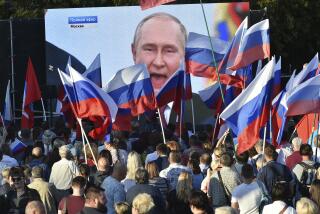‘89 Economy ‘Abysmal’ for Soviets, CIA Says
- Share via
WASHINGTON — The Soviet Union’s economic performance was “abysmal” last year, the worst since Mikhail S. Gorbachev took power, and things could get even worse this year, the Central Intelligence Agency reported today.
“By the end of 1989 only 50 out of 1,200 basic consumer goods were readily available. Meat and sausage were rationed in one-fifth of the major cities and soap, detergent and sugar were rationed almost everywhere,” John Helgerson, CIA deputy director for intelligence, testified at a hearing of the Congressional Joint Economic Committee.
“Soviet economic performance was abysmal in 1989--the worst since Gorbachev took over,” he said.
He said economic reform plans were poorly implemented and were hurt by a legacy of over-centralized planning and bureaucracy that has left the Soviet Union far behind Western nations in computers and other advanced technology.
The Soviet Union was also hurt by natural disasters such as the Armenian earthquake and by labor and ethnic strife which cost 7 million workdays last year, Helgerson added.
“As we look ahead the prospect of even a modest economic recovery appears to be remote at best,” he said.
“The most likely outcome for 1990 is that the Soviet economy will stagnate or decline slightly, that inflationary pressure will remain strong and that widespread inflationary shortages will persist.”
“The Soviet economy’s performance during the first quarter of 1990 indicates that the administrative measures taken so far to stabilize the situation have failed to take hold. At the same time, ethnic and labor unrest, if anything, have been more disruptive than in 1989,” Helgerson said.
He said economic prospects are better in Eastern Europe because of political changes that have ended communism and are moving the countries toward free market economies. But he warned they face great difficulties.
Helgerson said the key to economic recovery in Eastern Europe will be the ability of the countries to attract private foreign investment which depends on their success in creating stable political and economic environments.
“Poland is well on the way, and in some of the other countries--East Germany, Czechoslovakia and Hungary--a good start is likely by the end of the year.
“At the other extreme, we think that countries like Yugoslavia and Romania are grappling with more deeply rooted problems that will present greater impediments to near-term progress,” he said.
Dennis Nagy, the acting deputy director for intelligence for the Defense Intelligence Agency, told the hearing that Soviet economic problems and political changes in Eastern Europe have forced cutbacks in military forces and a 4% to 5% decline in Soviet defense spending.
More to Read
Sign up for Essential California
The most important California stories and recommendations in your inbox every morning.
You may occasionally receive promotional content from the Los Angeles Times.











